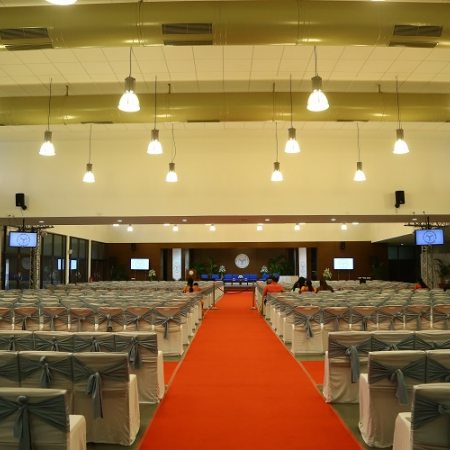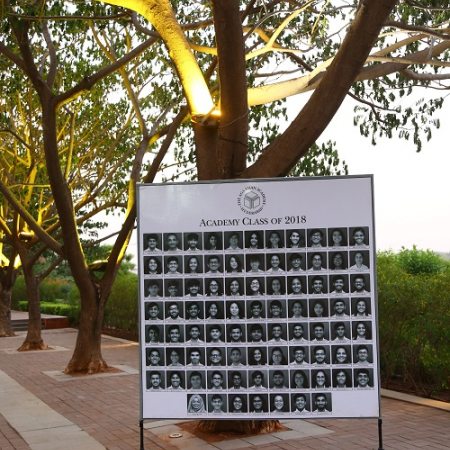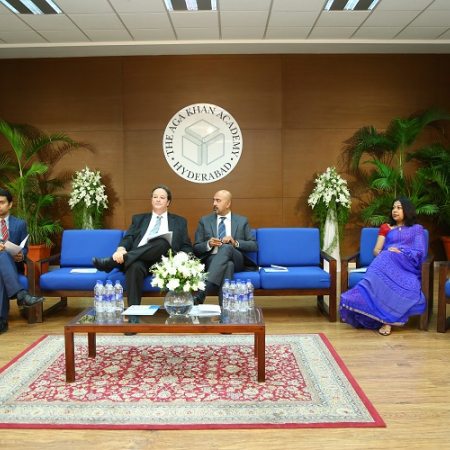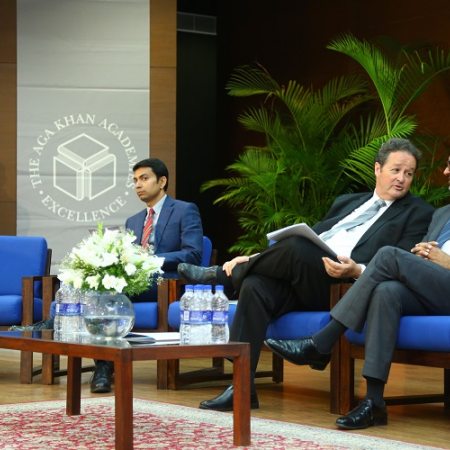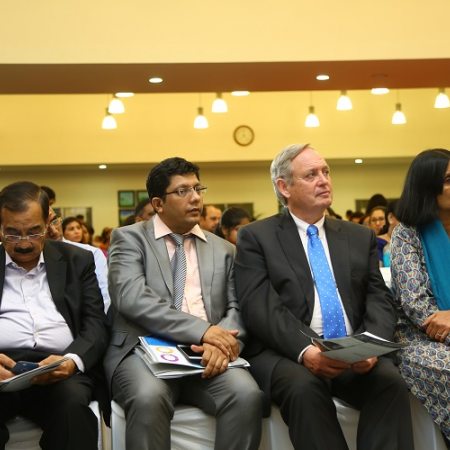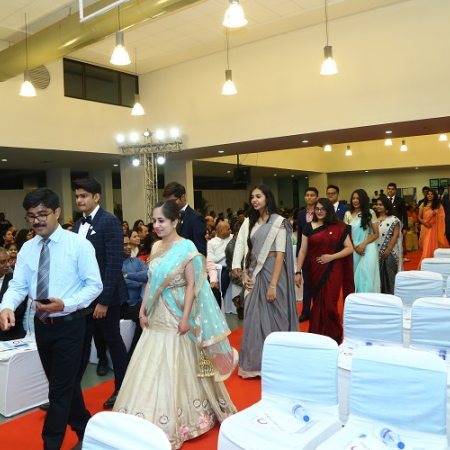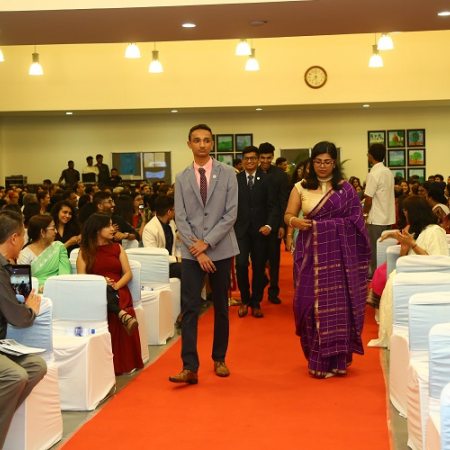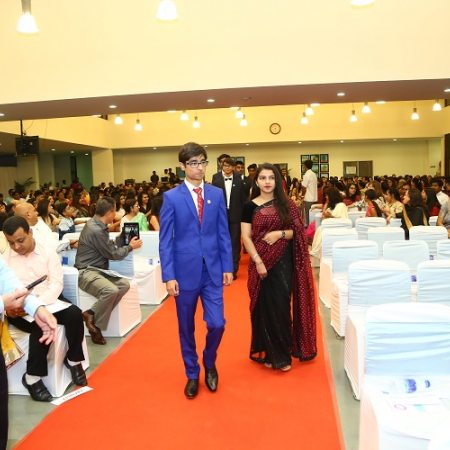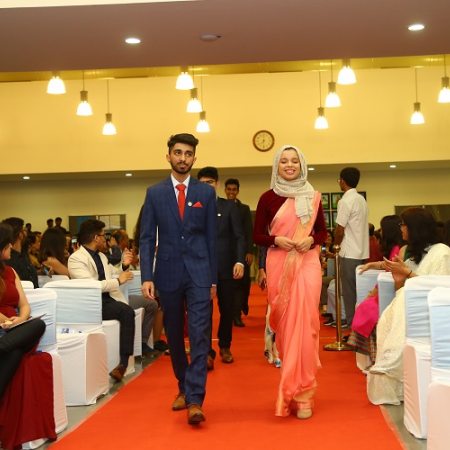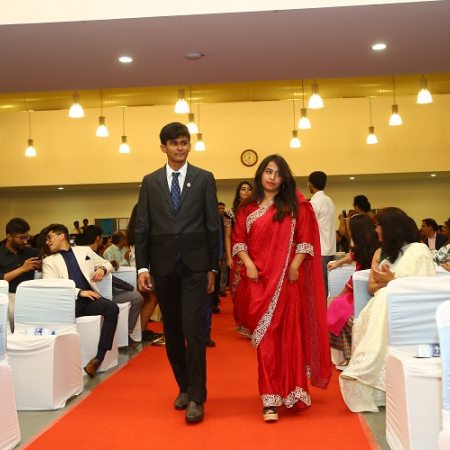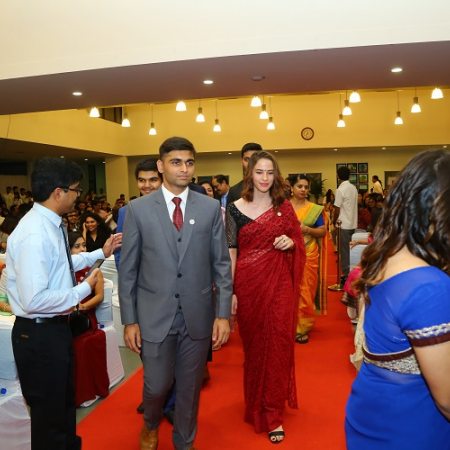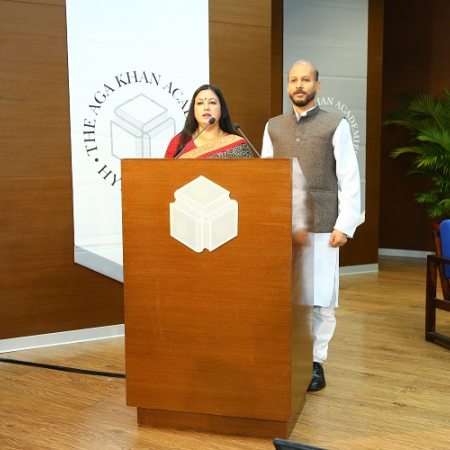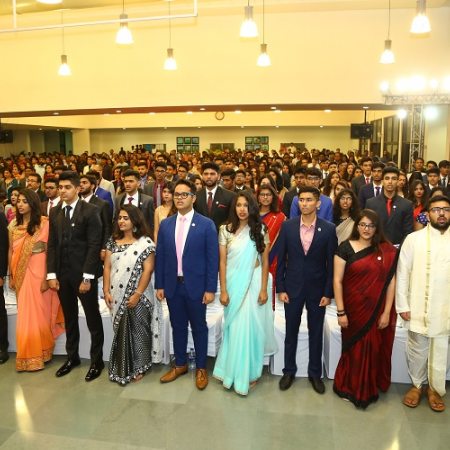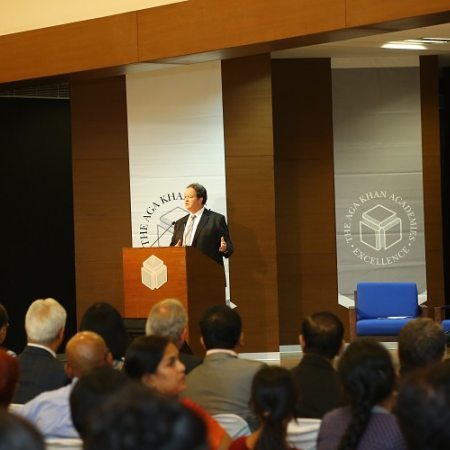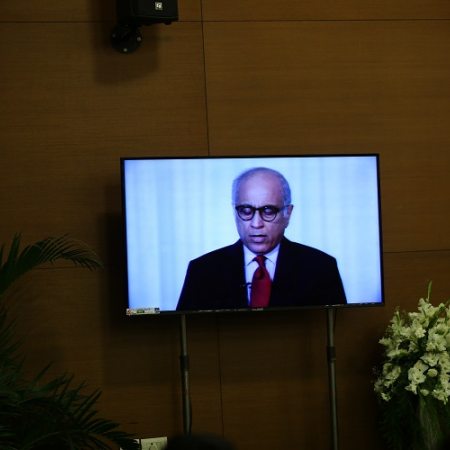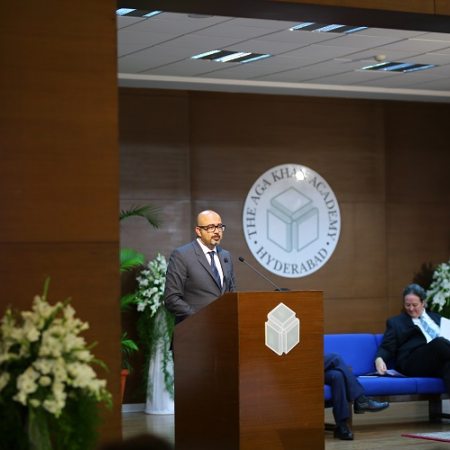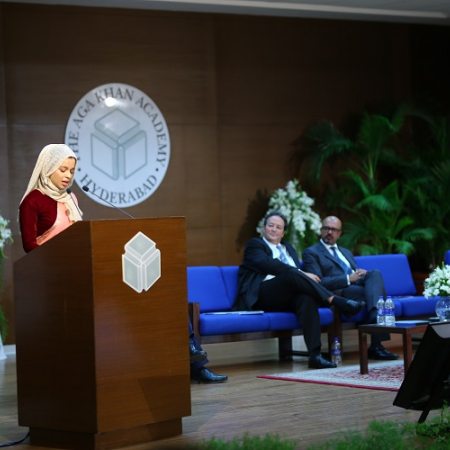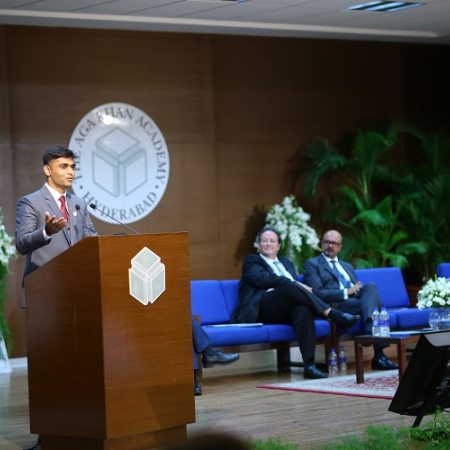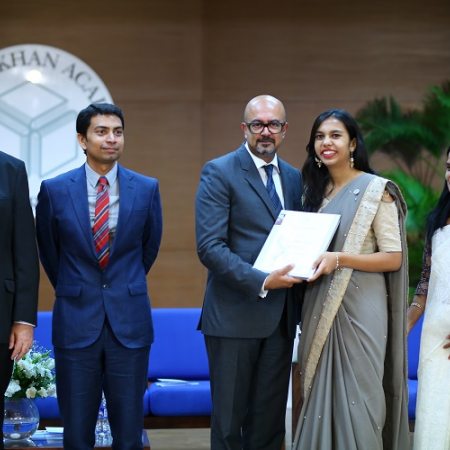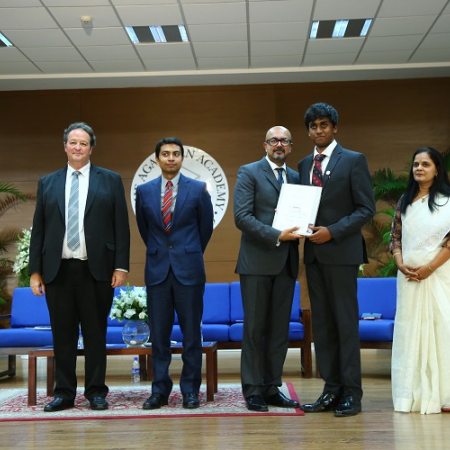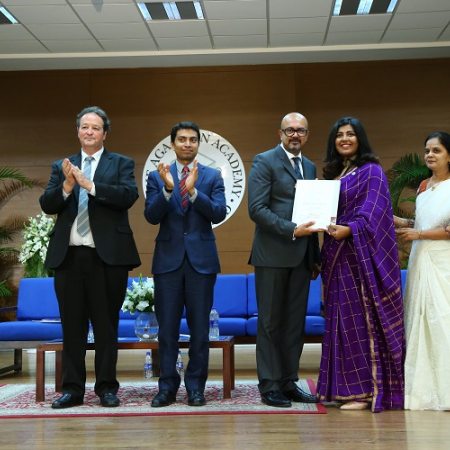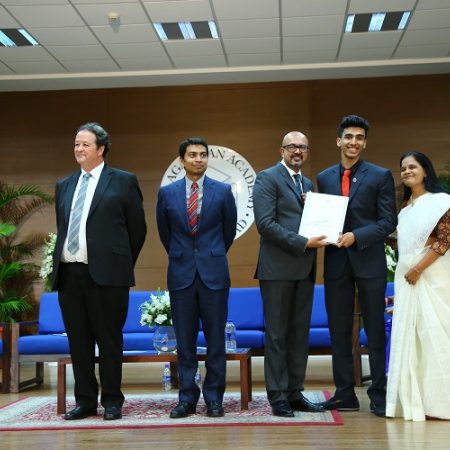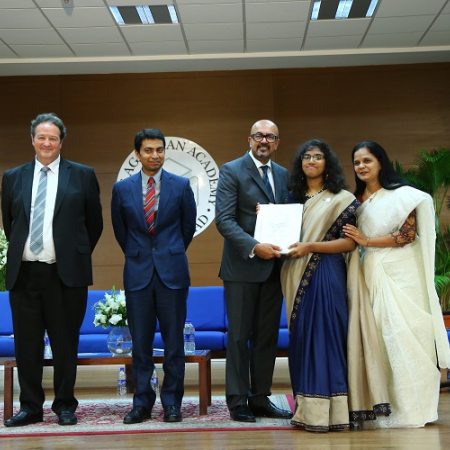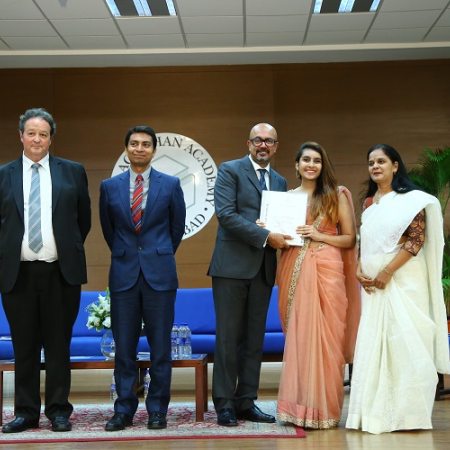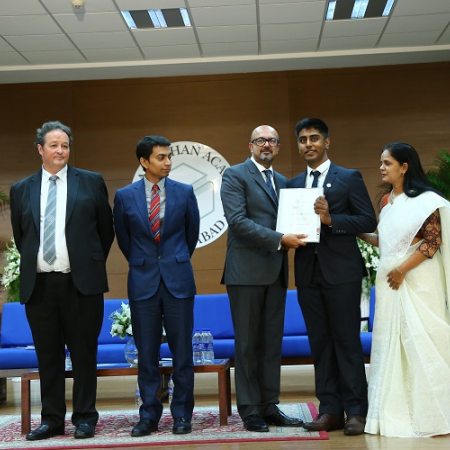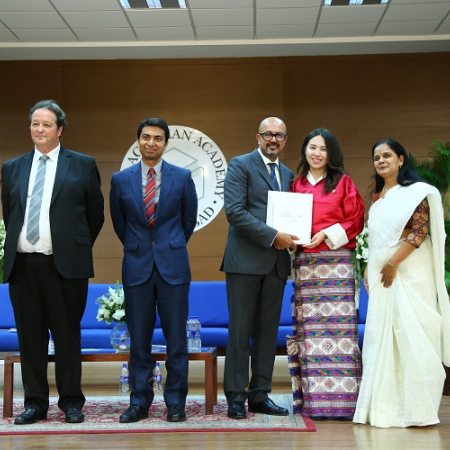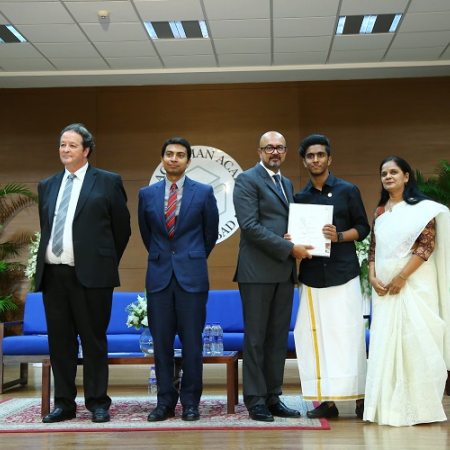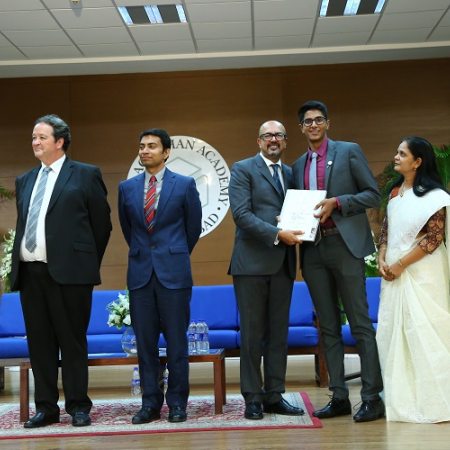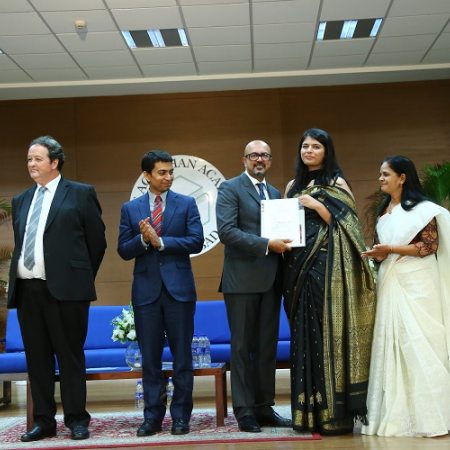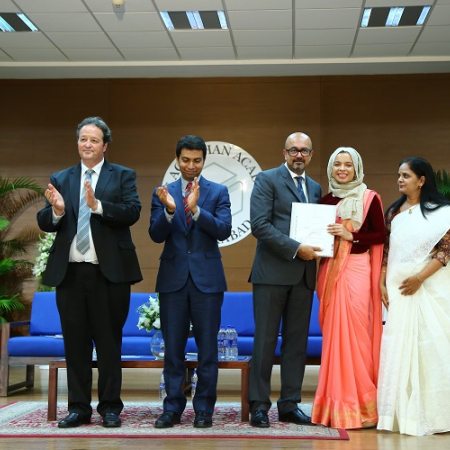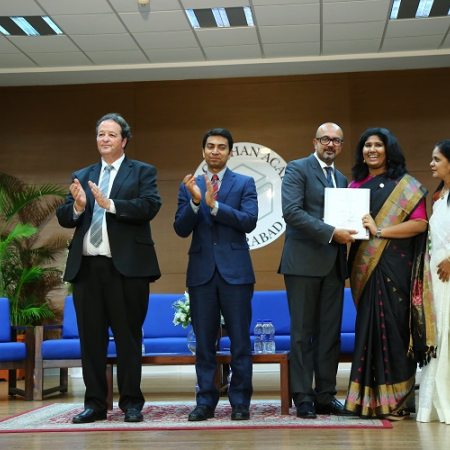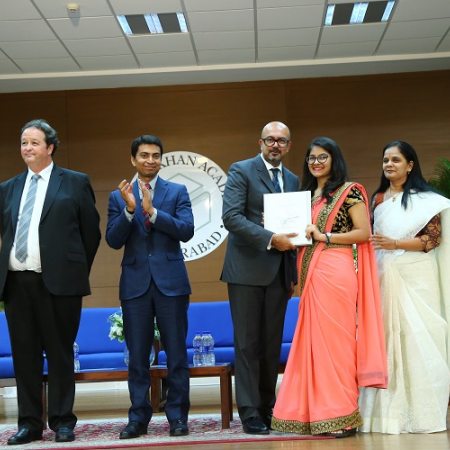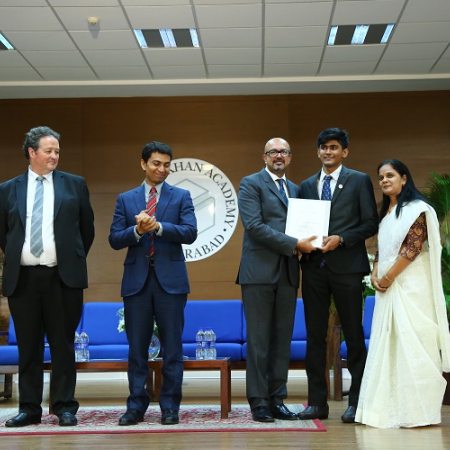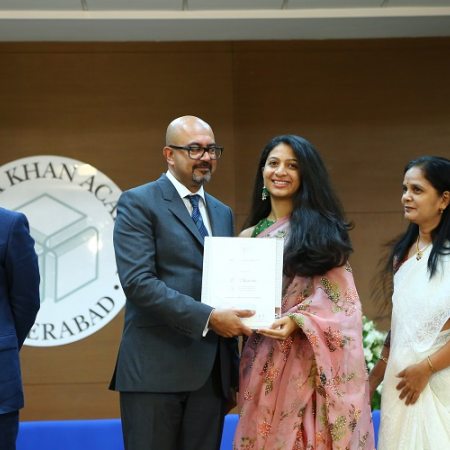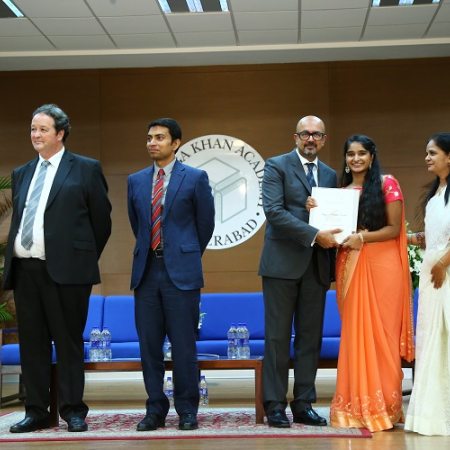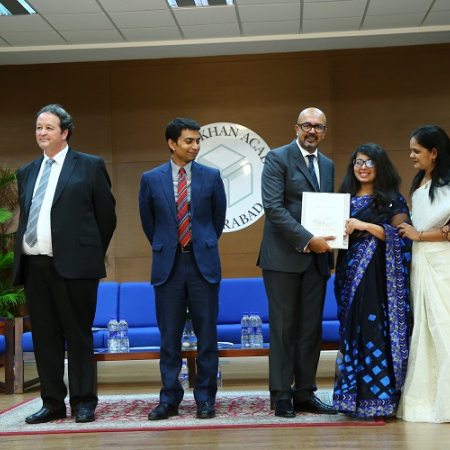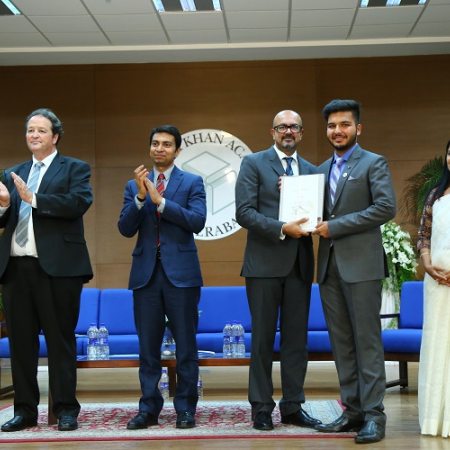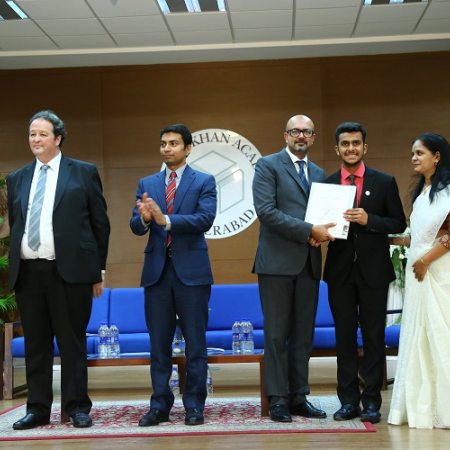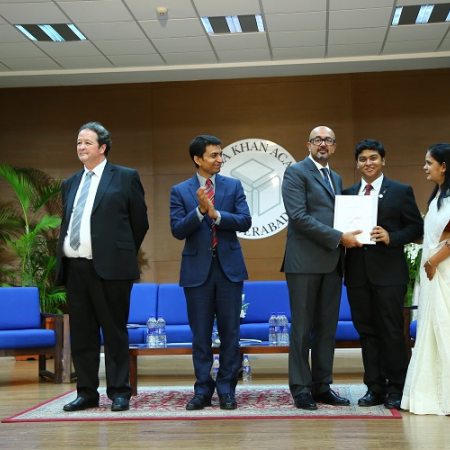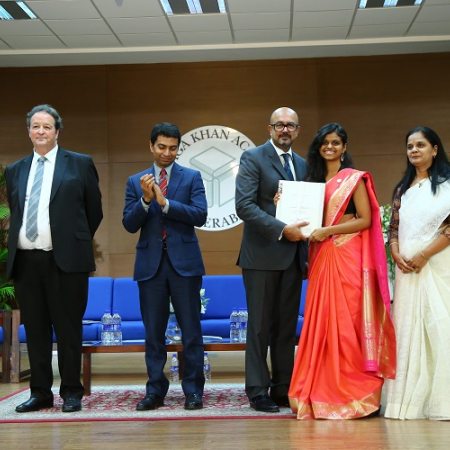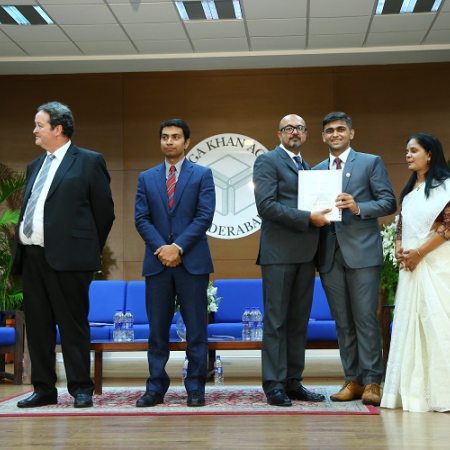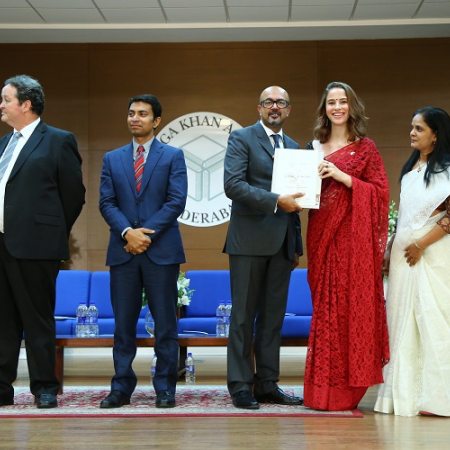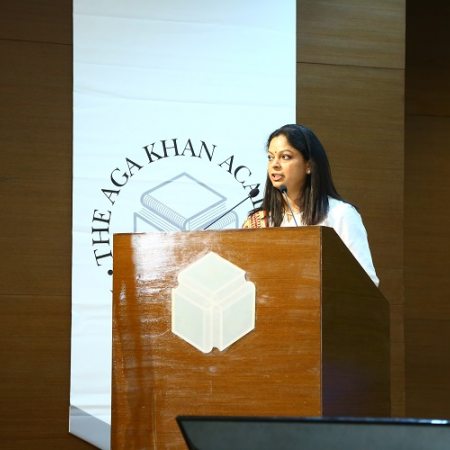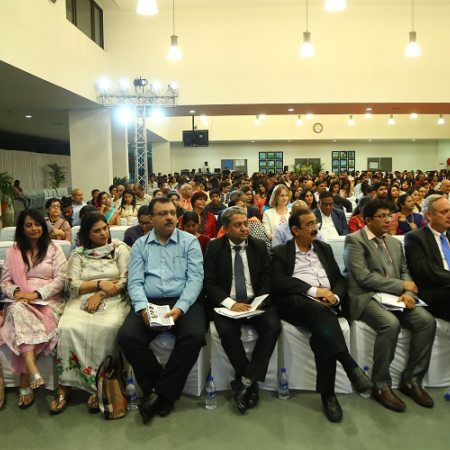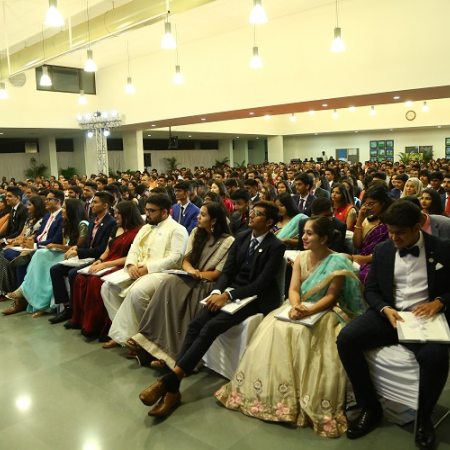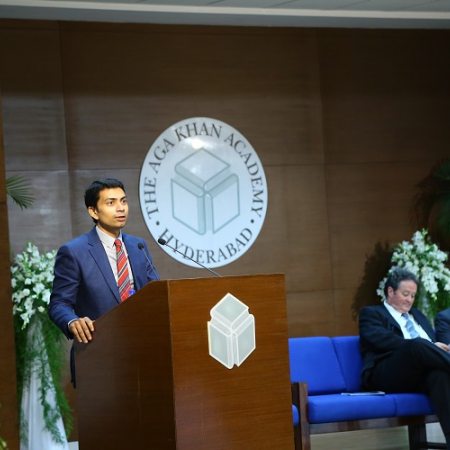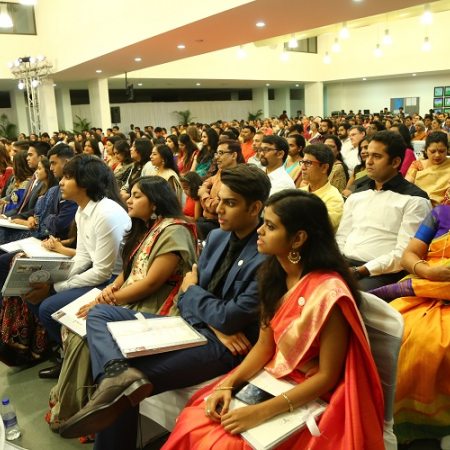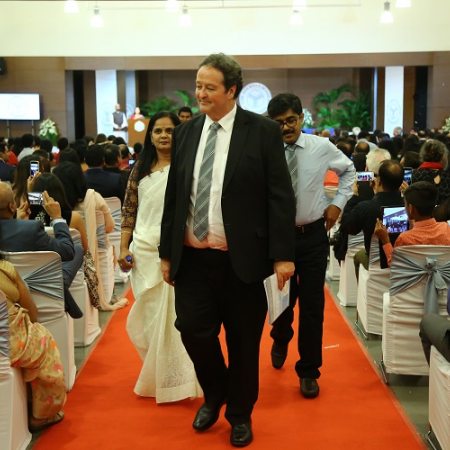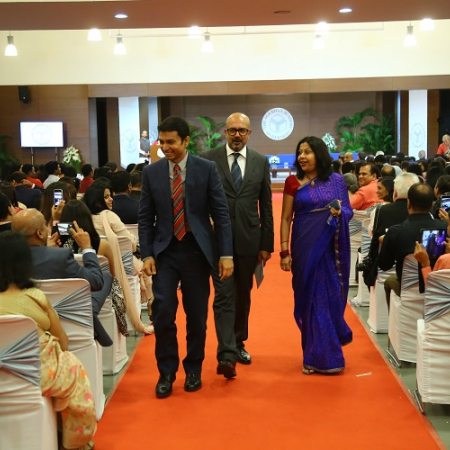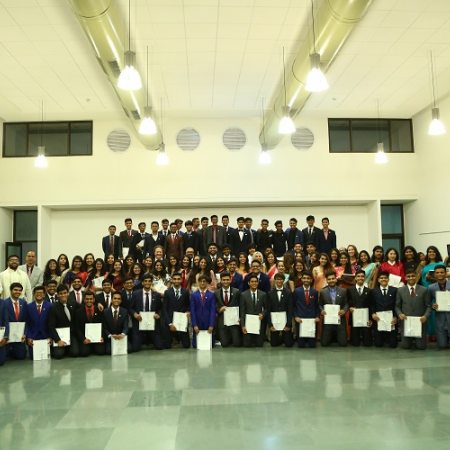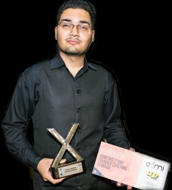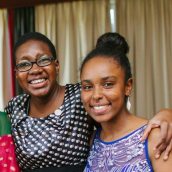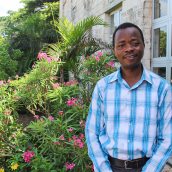National Holiday on 15 August 2019 - Independence Day
Flag hoisting at 8:15am at the boulevard for residential students & faculty, with special breakfast to follow. Academy not in session.
First inter-school ToK conference - Friday 25th October
will be held at AB basement from 9:45 am onwards. The discourse theme is 'the motif of power'.
Grand Cultural Fest - Saturday, 9th November
Residential students host an annual cultural fest to celebrate pluralism and diversity in the Academy's amphitheatre. Celebrations begin from 5 pm onwards!
Children's Day - Thursday 14th November
Celebrating Jawaharlal Nehru's birth anniversary with a variety of dance, drama and music performances. A fitting celebration of & for children and their education!
Graduation 2018
The Aga Khan Academies celebrated the graduation of 160 students from the Academies in Mombasa, Kenya and Hyderabad, India on Saturday, 19 May 2018. The Class of 2018 included 76 students from the Aga Khan Academy Mombasa and 84 students from the Aga Khan Academy Hyderabad, many of whom will be going on to higher education at leading universities worldwide.
Joseph Munyambanza: The story of a conqueror
As we sat for our lesson on a sweltering Tuesday afternoon, there was anticipation for the upcoming week-long break, obstructed only by the last lesson of the day. We sat for a while in a lazy stupor before our speaker arrived humbly apologising for his delay. Joseph Munyambaza was calm and composed as he began his initial talk on disparities of living. Despite appearing to be an average man who started by talking of ordinary sundries, he informed us that he was raised as a refugee and that it was education that propelled him to the position he is in today.
He began by narrating to us that life was free and full of enjoyment in the Congo. “There was plenty of food, I was always playing…” he recalls as he spoke of his six-year old self. Due to his age, he is now aware that he was shielded from most of the atrocities that must have taken place. His older siblings on the other hand, were not as fortunate. “My brother, who was a teenager at the time, was greatly disturbed by the events that took place…” Eventually, his older brother sought comfort in alcohol in an effort to forget what he had seen. Joseph’s family relocated to refugee camp in Western Uganda in a place called Hoima. Life was different and evidently, it was hard. The life of abundance and freedom was long gone and now the life of lack and want was all that there was. You can imagine the terrible living conditions in the refugee camp which was congested and dangerous. As he grew life seemed to eventually settle when tragedy struck. Joseph’s older sister passed away only a few days before exiting the refugee camp to attend university. What really moved me was the fact that she died under preventable circumstances. His sister died because his family did not have sufficient funds to pay for treatment.
This turning point propelled him to getting a placement in a high school outside the refugee camp where he was to begin to establish his academic prowess. He further explained that he knew how important his opportunity was so he would remain focused in his studies at all costs. Things were running smoothly throughout his years in high school with his school fees sorted out by the UNHCR. He was determined to also give opportunities to other refugee children who, just like him, were so full of potential. “When I was in my second year of secondary school, my friends and I wanted to enable other refugee children to access education. And so we started COBURWAS, a youth organization that represents Congo, Burundi, Uganda, Rwanda and Sudan. Refugees in the refugee camp we lived in came from these countries and we wanted to have a shared solution. All youth came together to think of solutions. Though we had many challenges we realised that lack of access to education was more dangerous. We started tutoring, which I did to enable children to get good grades and feel motivated to love school. We also worked for people to raise money to buy exercise books for the most vulnerable children in our midst. We were a club at first, but with time our programs expanded and we became a community-based organisation. The refugee community was of great help because they supported us with the little available and it meant so much in our small start.”
However, in his fourth and most senior year, his scholarship was withdrawn. “My education was initially supported by UNHCR in senior one but when I went to senior two they sent letters that UNHCR does not have more money to support education. Fortunately, a friend called Eric Glustrom who was starting an organisation helped me to complete senior four.” Even with a graduate certificate under his belt, he was unsure of what was to come next. Then, another whirlwind of events took place such that he was admitted to the ALA (African Leadership Academy) located in South Africa. This is an institution that is internationally recognised for producing innovators and entrepreneurs who are sure to make a positive impact within their home countries. Joseph says, “I had no dream of getting to a great school like ALA. I was already extremely grateful to be in my school that was the best in the district. And so even after being accepted to into ALA I still did not believe it until I landed in Johannesburg and was handed the key to my room. It was more than I could have ever dreamed of. And when I reached at ALA I wanted to be the best I could as a student, an ambassador to my fellow youth in the refugee camp and do well in class.”
All in all, his story was able to bring out the extent of the disparities of lives outside our own. The concept of war, forced migration and other forms of hardship is one that cannot be explained in a short period of time but were nevertheless highlighted in his talk. It is fascinating how a life can change simply as a result of joint efforts and self-motivation. By the end of his talk it was crystal clear that according to Joseph Munyambanza, education is a powerful tool.
By Bijou Mwaura, DP1
Kashyap Gohel (Class of 2011): Providing solutions to improve the world
Kashyap Gohel has been pursuing a Bachelor of Architecture programme at the Jomo Kenyatta University of Agriculture and Technology (JKUAT) in Nairobi, Kenya since graduating from the Aga Khan Academy Mombasa in 2011. "My top marks at the Aga Khan Academy earned me a government scholarship which is about 85% of the annual fees for my architecture course of six years," says Kashyap very proudly. He expects to graduate from JKUAT in June 2017.
"I think the main values the Academy instilled in me were positive attitude, time management, assertiveness, competitive spirit and self-confidence. These are values that I apply on a day-to-day basis to form the foundation of a successful career in art, product design and architecture," Kashyap says confidently. He also adds that the confidence that his skill set gives him takes him further than most in trying challenging and new projects in his field. With this experience in mind he says, "I am sure I shall be quite a pioneer in creating world-changing ideas."
Kashyap believes the coursework at his university and his time management are going smoothly due to the intense training at the Aga Khan Academy. "Coming from the Academy, I believe it set me a level ahead of others, enabling me to go further than my fellow students." He also values the International Baccalaureate curriculum. "It is the only system that I know of that makes it possible for one to develop holistically. One does not just learn academics, but also extracurricular activities, leadership skills, developing talents and solving community problems," he says emphatically.
Since graduating from the Aga Khan Academy, Kashyap has participated in many major events and activities that have brought him recognition and accolades. He was a winner of the Perstorp Open Innovation Challenge 2016 in Sweden which involved submitting ideas on making, repairing and remolding furniture into new shapes and designs rather than disposing of used or broken pieces in landfills. Kashyap has also won the Disruption by Design Award for architectural design in 2015. Other accomplishments include being awarded a tender to create a 14-foot-tall carving at Jomo Kenyatta International Airport in Nairobi, Kenya in 2014 and winning the first round of the Thought for Food Challenge 2013 – an annual competition that challenges university students to develop an innovative solution to improve food security. He also won an international graphic design contest for an Irish boat-making company and has displayed his artwork at Diani Beach Art gallery, Tazama Art Gallery and Kenya Art Fair.
Kashyap was also nominated and sponsored to attend the One Young World conferences in Pittsburgh, USA in 2012, and in Johannesburg, South Africa in 2013. These summits gather the brightest young leaders from around the world, empowering them to make lasting connections and develop solutions to some of the world's most pressing issues.
Kashyap is particularly proud of his first community service project, called Project Desert Farms. He designed this as an architectural solution to help communities on the coast to filter ocean water, obtain housing and food, and reduce deforestation. This project was selected as a finalist project from a worldwide participation of 140 teams, and the only one in Africa that made it to the Thought for Food Global Summit in Berlin, Germany.
While at the Aga Khan Academy Mombasa and after graduating in 2011, Kashyap has been actively involved in many projects and volunteer activities and has also worked for the Academy and other companies in his field. In 2011 he worked with planning and construction management at the Aga Khan Academy. He also volunteered there as a theatre teacher for years 7–10 in 2012 and was involved in the design of two of the Academy’s residential blocks.
Kashyap's most unforgettable experience at the Academy was being a dorm captain in the residential programme. "One of the things I miss about the Academy is the organisation…[and the] efficient order in the way it operates," he comments. Another thing he misses about the Academy is the facilities. "It’s only after leaving the Academy that you appreciate the constant high speed Wi-Fi, adequate number of desks and chairs for students, high-class sports facilities and equipment, and most of all the great ocean climate and friendly people. As they say, nothing beats home," Kashyap reminisces nostalgically.
Erica Byenkya (Class of 2014): Contributing to society with love and generosity
Erica Byenkya, who is a fourth-year student at Saint Mary’s University in Halifax, Canada, is a graduate of the Aga Khan Academy Mombasa and originally from Uganda. Since leaving the Academy in 2014, Erica has been pursuing a Bachelor of Commerce at the university with a double major in marketing and computer and information systems. She is expecting to graduate from the university in May 2019.
“I think that my Academy experience was vital in my success in university so far,” Erica says confidently.
The Academy, she says, nurtured within her a love of volunteering that helped her make connections and friends and ensured she remained connected to her local community.
“I think that we were definitely more focused on encouraging independence and community service than the schools attended by other students,” Erica comments.
The experience of living in residence at the Academy, she says, also helped her become more self-sufficient and taught her how to take care of herself – this was useful when she moved to Canada for higher education.
At university, Erica has worked through three work terms as part of the cooperative education programme. In these three terms, she has worked as a marketing coordinator for a software development company and at a non-profit organisation focused on encouraging students and faculty in the sciences. She has also taken up volunteer work, including with a local after-school youth programme and as the public relations representative of the Saint Mary’s African Student Society (SMASS). She is currently preparing for her second year with SMASS.
Erica is also doing well in her academic work. She received an entrance scholarship from Saint Mary’s University, which was increased last year due to academic achievement. Erica thanks her counsellors at the Academy in Mombasa for supporting her with her applications.
“I had a very hard time writing my personal statements for my university applications and I know that without the help of my counsellors, I would not have been accepted into all the universities I applied to.”
At the Academy, Erica was one of the founders of a service group that aimed to support local farmers in the area by consulting with them about their families’ needs and fundraising to help meet those needs. Through their efforts in the first year, they helped one family send their youngest children to school, build a small shop to sell their wares and buy new seeds. The service group also helped pay the exam fees of the entire graduating class of a local school so they could all sit their final exams.One of the many things Erica misses at the Academy in Mombasa is her wonderful friends.
“I am still in contact with some of them online but being able to spend so much time with them was a gift I am very thankful for,” she says.
Her most unforgettable experience at the Academy, which she is very proud of, was learning to play the violin; this, to her, was the most difficult to learn among other musical instruments. She fondly remembers her teachers: Mrs Mwandawiro, her dorm mother and chemistry teacher, and Mr Dudi, whom she calls, “my wonderfully dramatic English teacher.”
“They both pushed me very hard because they had high expectations for me, and while I did not perform as well as I hoped in chemistry, their expectations always encouraged me,” she says.
Erica chose to participate in the International Baccalaureate (IB) programme because she felt, and still feels, it offered her greater flexibility in her choices for the future.
“With the national curriculum, you are restricted to three subjects in your final two years," she says. "But I was unsure about the career path I wanted to take, so I really appreciated being able to further study interesting subjects in the IB programme while deciding what I wanted to do with my future."
Erica says her plans after graduating from university are to stay and work in Canada for a while and then eventually make the decision about whether to pursue a postgraduate degree.
“I do see myself coming back to Uganda, but before that happens I would like to travel more.”
When asked what she would focus on to improve the lives of people in her country if she had all the resources at her disposal, Erica hoped that one day she could contribute to the renovation of the Ugandan library system. She believes this would benefit all the citizens of Uganda, especially the young students whose schools may not have large libraries or who seek safe and productive spaces to spend their free time.
Stephen Nyundo: Fostering students’ growth through Mathematics
Before we enter the 2019 – 2020 academic term, we would like to spotlight a few staff from AKA Mombasa who are going on to pursue new adventures in the upcoming academic year. Here, we take a look at Stephen Nyundo, a Mathematics teacher and head of the department, and his five years at the Academy.
Stephen Nyundo is from the Kenyan coast, specifically from a place called Kaloleni and was the head of department for the Mathematics department at the Aga Khan Academy Mombasa. Apart from the Mathematics department, Stephen was also the year level leader for year 9.
During his five years at the Academy, Stephen said he has admired the supportive relationships he’s made, which have helped him become a better teacher.
“My experience has been enriching and very rewarding at the Academy,” Stephen said. “I have interacted with friendly and accomodating people who did not look at my weaker side. People would tell me things would be fine, even when they actually appeared otherwise. I was supported in my early years in my professional growth and got an opportunity to learn all that I needed to learn. I will miss the family, friendship, strong ties and network I’ve built here. I will definitely miss the Friday treats.”
Stephen said the ethics and values instilled at the Academy not only influenced the students, but himself as well.
“The Academy has molded me to what I now am,” Stephen said. “I will carry with me the Academy values that I am sure will propel me to greatness.”
For the Mathematics department, Stephen said he has worked with students to develop methods on helping other students who might struggle with the subject.
“A good example is 'Euler Fulfillers', a YouTube initiative by two of my Mathematics HL students who came to me with the idea,” Stephen said. “After brainstorming, we thought this was the best move where Academy students can share with their fellow students in the Academy what they know best and also help others out with challenges in Mathematics. The other platform is the ‘MathMagic’, which brought together students from all of the classes to showcase how Mathematics is applied in real-life in the various units covered. The next platform we had planned to start working on was the 'Mathletics', which is a modified form of a treasure hunt. This is where talent is found; students make use of what they have learnt in the classroom to various situations in real-life.”
After his time at the Academy, Stephen said he is ready to pursue other teaching opportunities. However, Catherine Orwe, a Mathematics teacher who works with Stephen, said he will be dearly missed at the Academy by both students and his colleagues.
“Stephen has not been just a colleague for us, but a true friend and a person with a big heart,” Catherine said. “He always made time for all even when he had tight schedules to meet. He is always very positive even when the rest of the crowd was struggling with issues. He always worked very collaboratively with colleagues to achieve our departmental goals. He pleaded with members’ input by genuinely valuing others’ ideas and expertise, and he was always willing to learn from all of us. Yes, we have learnt so much from him. He is an amazing Mathematics teacher, and I know his students here will miss him. Stephen is a person that pays attention to details in everything that you do and he is the one who would point out the changes that we needed to make in our presentations both at table and the curriculum implementation. We will definitely miss having a wonderful friend like Stephen. Good luck to him in his future endeavors! We hope the new place he goes to is full of fun and happiness.”
AKA students get offers from top world varsities
The Hindu reports on the successful offers received by Aga Khan Academy graduates from top universities around the world.
